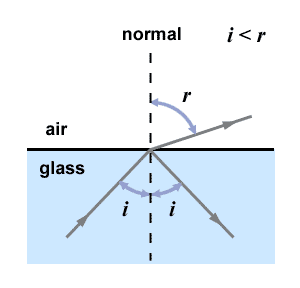Condition for total internal reflection
1.Light travel from a denser to rarer medium
2.i > C in denser medium for a pair of media in contact
Explaination
Suppose that a laser beam is submerged in a tank of water and pointed upwards towards water-air boundary.
The Formation of Mirage
1.Light travel from a denser to rarer medium
2.i > C in denser medium for a pair of media in contact
Explaination
Suppose that a laser beam is submerged in a tank of water and pointed upwards towards water-air boundary.
The maximum possible angle of refraction
is 90-degrees. If the angle of refraction
were greater than 90 degrees, then the refracted ray would
lie on the incident side of the medium. There is some specific value for the angle of incidence
(the critical angle) that yields an
angle of refraction of 90-degrees.Any angle of
incidence that is greater than the critical angle would not
result in refraction. All of
the energy (the total
energy) carried by the incident wave to the boundary stays
within the water and undergoes
reflection off the
boundary. When this happens, total internal reflection
occurs.
Application : Mirage
A traveler has lost his way in the desert. Enduring thirst and hunger,
he suddenly saw an oasis, so the overjoyed man quickly ran towards it.
To his great disappointment, it was just an illusion produced by a
mirage.
Its formation is a result of the refraction and the total internal
reflection of light in the air. The Formation of Mirage
In regions of air with temperature decreases with altitude, light will travel in a curved path due to refraction.
Refraction occurs when a light beam travels from glass to the air. The angle of incidence i is smaller than the angle of refraction r.
Total internal reflection occurs when the incident angle i is larger than the critical angle c.
The path of light when a mirage happens.











No comments:
Post a Comment